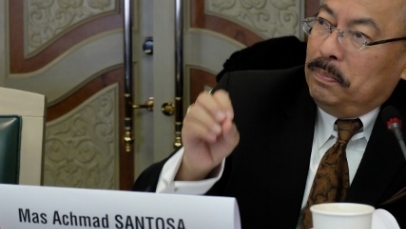INTERVIEW – Transparency is key for Indonesian fisheries

By blowing up boats fishing illegally in its waters, Indonesia has captured the imagination of many. In 2015, it has sunk more than 100 boats so far.

But the policy is just one aspect of broader Indonesian efforts to restore itself as a major maritime power. With 17,000 islands and one of the world’s largest fisheries, Indonesia wants to maximise the benefits of its impressive maritime resources.
And so, in addition to the rigorous clamp down on illegal fishing, which costs the archipelago some US$20 billion per year, Indonesia is reforming its fisheries management.
“Transparency is key”, says Mas Achmad Santosa, Head of Indonesia’s Task Force on the Prevention and Eradication of IUU Fishing, because it brings more accountability.
“If the public can better access the public policy making process, then they have more control over the issues that affect them,” he says, on the sidelines of the 2nd Advisory Group meeting of the Fisheries Transparency Initiative (FiTI) meeting in Rome.
More transparency, including the publication of fishing contracts on an official website, will also allow local fishermen to know whether an unknown boat is fishing illegally in their waters.
“We cannot rely on the government to manage everything in a country that has a population of 250 million and a coastline of 81,000 kilometres,” he says.
“Transparency empowers coastal communities to protect their local waters.”
More transparency in Indonesia’s fisheries is consistent with reforms in other sectors, such as forestry. But by itself transparency may not be enough.
“Participation is also important,” says Santosa.
In the FiTI model, different stakeholder groups share information and check that the shared information is credible. When they have credible information, citizens understand better how their natural resources are being managed. They can also demand improvements.
“Our forestry, extractives, and fishing sectors all face complex issues”, says Santosa.
Indonesian efforts to improve its fisheries management also include better vessel registration, port state controls, catch and trade reporting, fishery licence governance, surveillance systems, human rights traceability, and cooperation with other regional and international authorities.
For now, the crackdown on illegal fishing remains a top priority. A recent review of 1,132 foreign fishing boats found that not a single boat was compliant with Indonesian regulations. The review also linked these boats to human rights abuse, money laundering, corruption, and tax fraud.
Publication of the review offers another example of how Indonesian fisheries are becoming more transparent. But will the archipelago nation sign up for FiTI?
“If the government didn’t want to join, they would not have sent us here.”